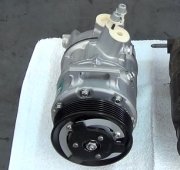1999 Jeep Wrangler 6 cyl Four Wheel Drive Manual 100K miles
Hi - my Jeep idle jumps between 800 & 1100 RMPS in a cycle. It's usually at 800 RMPS for 7 seconds than jumps to 1100 RPMS for about 4 seconds. I looked under the hood and the idle heartbeat appears to be in sync with the cycle of the AC Compressor - (it actually heatbeats in sync with the black disc inside the wheel that is driven by the belt
FYI - I recently replaced the serpentine belt. Before I replaced the belt the jeep had trouble starting, struggled just after starting, and would sometimes stall when I hit the clutch - i.E. High RPM's to low RPM's - but with the new belt I have not experienced any of these problems. The only issue that it had before replacing the belt that still remains is the idle heartbeating. I just wanted to mention the previous issues in case they are related.
SPONSORED LINKS
Thursday, May 28th, 2009 AT 9:56 PM



